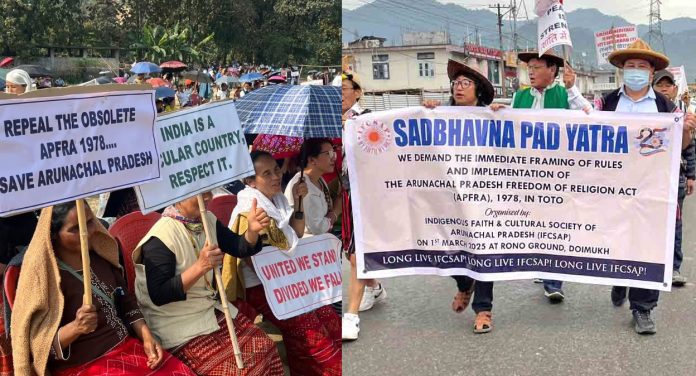On March 6, Christians in Arunachal Pradesh staged a protest against the impending implementation of the Arunachal Pradesh Freedom of Religion Act (APFRA) of 1978. The demonstration, organized by the Arunachal Christian Forum (ACF) at Borum near Itanagar, voiced concerns that the law would deepen religious divisions in the state, which shares a border with China and has maintained relative peace.
According to ACF president Tarh Miri, over two lakh Christians from various denominations participated in the rally. ACF has been actively opposing the enforcement of APFRA, arguing that it curtails religious freedom and disproportionately affects Christians. The Gauhati High Court’s Itanagar Bench, after hearing a plea in September 2024, directed the state government to formulate rules for the act within six months. The plea criticized the government’s prolonged inaction in implementing the legislation.
APFRA was initially passed in 1978 under the tenure of Arunachal Pradesh’s first Chief Minister, P.K. Thungon, but successive governments have failed to enforce it. With the court-mandated deadline approaching, the ACF has intensified its efforts to repeal the law. Miri stated that despite a meeting with Arunachal Pradesh Home and Indigenous Affairs Minister Mama Natung, where the minister conveyed that repealing the act was not feasible due to Presidential assent, the ACF decided to proceed with the rally. The minister assured the formation of an inclusive committee to oversee the issue but urged ACF to call off the protest, which they refused.
Miri warned that if the act was not repealed by the end of the month, ACF would organize a referendum rally. He further alleged that the government was under pressure from “external communal forces” to implement the act. ACF Secretary General James Techi Tara asserted that the act’s enforcement would create hostility, emphasizing that changing faith is a personal choice.
The Arunachal Pradesh BJP government, however, maintains that APFRA is not targeted at any specific religion. Home Minister Natung stated that the government would conduct consultative meetings with religious leaders and stakeholders before finalizing the law’s implementation. Chief Minister Pema Khandu urged residents not to misinterpret the act, explaining that the drafting process was in line with the court’s directive.
Former Home Minister James Lowangcha Wanglat highlighted the geopolitical sensitivity of Arunachal Pradesh, which is located at the tri-junction of India, China, and Myanmar. He cautioned that reviving APFRA could have significant implications, especially given China’s claims over the region.
Meanwhile, the Indigenous Faith and Cultural Society of Arunachal Pradesh (IFCSAP) has been advocating for the immediate implementation of APFRA. They have held counter-rallies in support of the act, arguing that it is essential for preserving indigenous faith and culture. IFCSAP president Dr. Emi Rumi dismissed claims that the law was discriminatory, stating that it aims only to prevent forced conversions and protect traditional religious practices. He insisted that Chief Minister Khandu need not worry, as most residents support the act’s implementation.
The APFRA criminalizes religious conversion through force, inducement, or fraudulent means, imposing penalties of up to Rs 10,000 or two years in prison. It also mandates that all conversions be reported to the district’s Deputy Commissioner, with penalties for non-compliance.
Since the establishment of the region’s first church in 1957, Christianity has grown significantly in Arunachal Pradesh, rising from 0.79% in the 1971 census to 30.26% in 2011. This demographic shift has fueled debates over the preservation of indigenous cultures. To demonstrate their support for the act, indigenous faith groups organized a “Sadbhavna Pad Yatra” at Doimukh.
IFCSAP General Secretary Maya Murtem stressed that APFRA applies to all religions and primarily seeks to regulate conversions to prevent coercion and fraud. He criticized those opposing the act, suggesting that they may have ulterior motives. IFCSAP President Pai Dawe argued that APFRA was introduced in 1978 for the welfare of indigenous tribal societies but has remained unimplemented despite repeated requests. Similarly, Kamjai Taism of the Rangfrah Faith Promotion Society (RFPS) stated that the law was not unconstitutional and was meant to safeguard indigenous traditions.
Arunachal Pradesh is home to diverse religious practices, including polytheistic nature worship, ancestor worship, and various Buddhist traditions. Among these, the Donyi Polo faith has become a widely recognized indigenous practice. The three major religious communities in the state are Buddhists, Christians, and followers of indigenous faiths, all of whom are closely watching the developments surrounding APFRA’s implementation.




